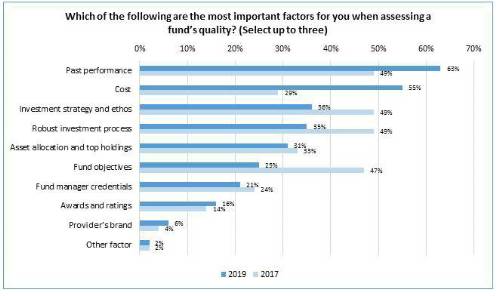In 2017 just 29% of advisers deemed cost one of the top three most important factors while today that figure is 55%. Past performance has maintained and extended its position as the most important consideration. In 2017 it came joint top and was cited as a consideration by 49% of advisers, a figure that has grown to 63% today.

In the minds of advisers, other factors such as fund objectives, robust investment process and investment strategy have all decreased in relative importance over the last two years.
The high figure for past performance shows the importance advisers place on funds demonstrating their credentials over time. Understanding the investment theory and ethos that underpins a fund’s strategy is one thing, but it appears that financial advisers value a real-world demonstration of success, albeit recognising that past performance isn’t a guarantee of future returns
Commenting on the findings, Nick Dixon, Investment Director at Aegon said: “Fund costs are clearly front and centre in advisers’ minds and this reflects a number of trends, including the growing use of passive funds, regulatory pressure on fund managers to justify costs and consumer demand for low-cost investments.
“Prioritising cost doesn’t necessarily mean choosing the cheapest fund available, but it does mean that where a fund comes with an additional cost, there is an assessment made that this cost brings with it the prospect of benefit to a level that justifies any additional fee. For example, such benefits might include the potential to improve investment growth or reduce volatility, or might mean that ethical considerations are met.
“Past performance has strengthened its position as the most important consideration when assessing funds and it’s understandable that advisers wish to see a strategy can deliver on its objectives. One implication of the focus on past performance is that the market may be slow to respond to change or the advent of new approaches. Advisers who focus on past performance should also be aware of any changes to a fund’s process, structure or management. Market conditions can also have an impact – a fund that has done well in the protracted bull market of recent years might struggle were market conditions to falter.”
To view the full report, including findings on a range of other investment trends:
|

